2021 Santa Cruz Nomad X01 Reserve Carbon CC
(discontinued)
| Where To Buy | |||
|---|---|---|---|
Free shipping on orders over $50 (continental U.S. only).
International shipping available. Some exclusions apply. |
|||
Free shipping on orders over $50 (continental U.S. only).
International shipping available. Some exclusions apply. |
|||

2021 Santa Cruz Nomad V5 Highlights
- 27.5-inch wheels
- 170mm of lower link driven VPP rear travel
- 170mm fork
- Flip chip adjusts head angle by .3-degrees
- 64-degree head angle and 78-degree seat angle (high position)
- Size-specific chainstay lengths
- Carbon C & CC frames
- Reserve 30 carbon wheel options (tested)
- Sizes: S, M, L, XL
- Revised leverage curve and twin swingarm uprights
- 37mm fork offset
- Available with coil and air shocks
- SRAM Universal Derailleur Hanger
- Lifetime warranty
- Price: $8,699 as tested (CC X01 Reserve)
- Weight: 32 pounds (size medium CC X01 Reserve with FOX Float X2 shock, with pedals)
Video Timestamps
- 0:00 - Intro
- 1:08 - Nomad Weight
- 1:52 - Nomad Frame Details & Geometry
- 2:44 - Nomad Frame Refinements
- 3:49 - Models and Prices
- 5:08 - Ride Impressions
- 7:26 - Coil or Air Shock?
- 9:35 - Longer Dropper Would Be Nice
- 10:22 - Conclusion
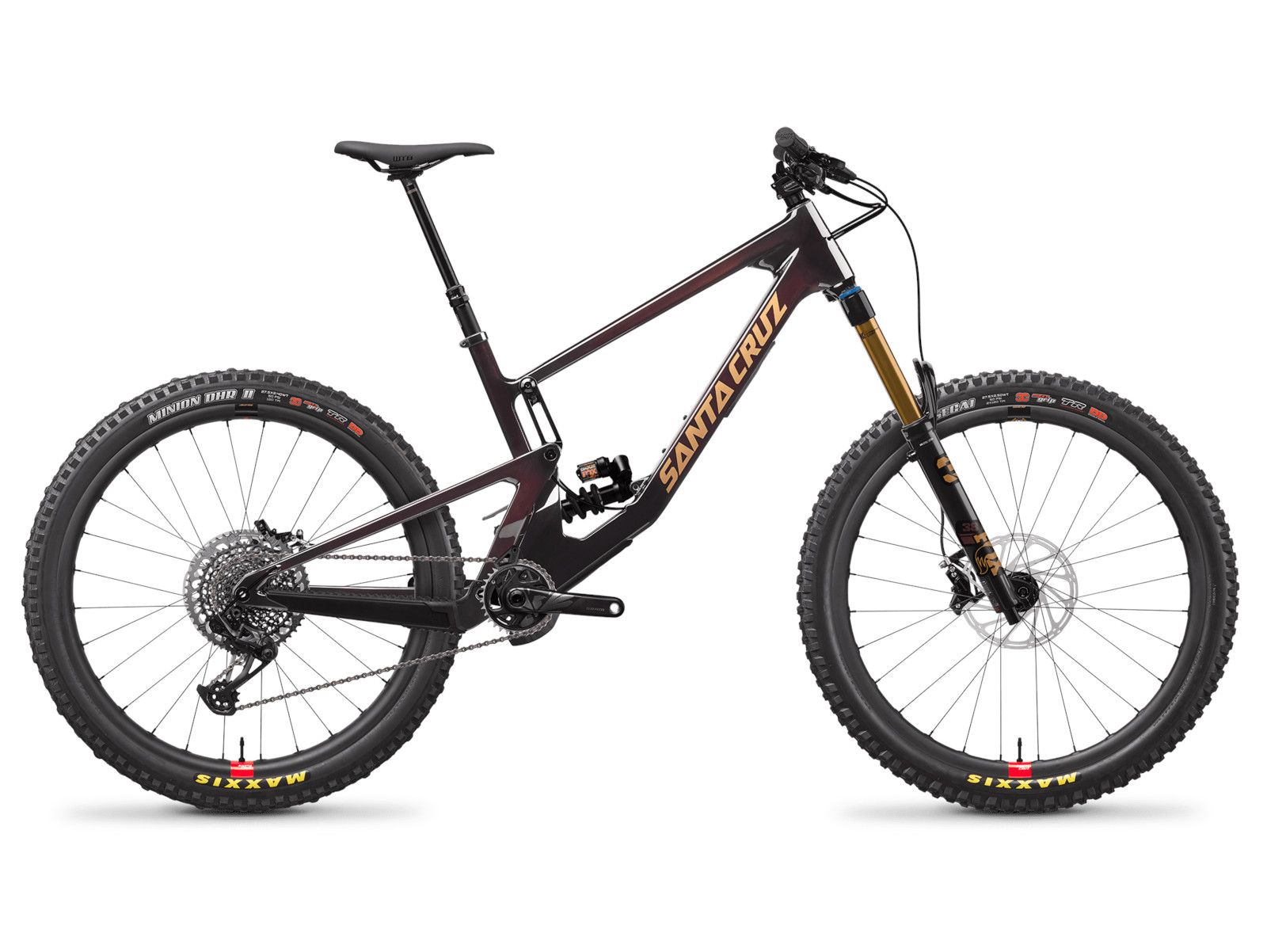
Strengths
| Weaknesses
|
What's New on the Santa Cruz Nomad V5
Geometry
Compared to updates the Nomad has received in the past, 2021's changes are somewhat tame. Keeping up with current sizing trends, the Nomad grows longer and lower. We ran the Nomad in the high setting of the flip-chip for a 64-degree head angle and 78-degree seat angle. There are now size-specific chainstay lengths. This done by adjusting where the rear triangle connects to the front triangle, so there are no unique brake adapters or derailleur hangers. Our medium has a 430mm chainstay length while a large is 435mm. Medium reach grows 10mm to 450mm with a top tube of 582mm. Seat tube length is low at 405mm. Respectively, a large has a 475mm reach, 610mm top tube and 430mm seat tube length, 20mm shorter than the prior generation.
Nomad V4 Medium in Low Position
| V5 Nomad Medium in Low Position
|



Suspension
The straight, progressive suspension curve has been tweaked a bit, and since both air and coil shocks are available on the Nomad, we tested both damper configurations. Shock stroke is longer than previous models allowing for easier suspension setup and more sensitive tuning. The Nomad now runs a 230x62.5mm shock compared to a 230x60 on the last version.

No Alloy Frame Option
Unfortunately, there are no aluminum frame options of the new Nomad. Carbon C and CC are the only frame choices available in the new Nomad. While Santa Cruz is not shying away from aluminum (they still offer alloy bikes in most of their line), metal wasn't to be for the Nomad. When it came time to develop the new Nomad, Santa Cruz wanted to keep focus on making the bike perform at its best and that meant only enough resources for carbon frame development. As demand for an alloy Nomad has waned, Santa Cruz could not justify the additional resources to produce the two alloy R and S build as in years past.


Setup and Riding Impressions
Jumping aboard the Nomad is comfortable. The updated, longer geometry is a welcome sight. The steeper seat angle isn’t so upright as to cramp the cockpit for climbing. Rider weight distribution is nice and central, providing good rear-wheel grip for steeper climbs and keeping the front end in check and on the ground.
Our particular build was the X01 RSV, which retails for $8,699 and is the top-spec offering in the Nomad line. Santa Cruz sent along a FOX DHX2 coil shock for us to try out. It is worth nothing that while a coil shock is a build option, it will also change the tires to MaxxGrip Double Down casing versus the standard EXO+ 3C MaxTerra. Regardless of coil or air for the rear shock, FOX Factory is the name of the game, mating to a FOX Factory 38 fork. A full SRAM X01 Eagle drivetrain with 32T chainring make the Nomad go, while CODE RSC brakes and 200mm rotors make it slow the heck down. Seatpost duties on all but the R build are covered by the RockShox Reverb Stealth. RSV means Reserve, giving our test bike Santa Cruz's carbon Reserve 30 rims instead of the Race Face ARC 30 found on the non-RSV delineated models.

FOX DHX2 Coil Shock Configuration
We knew Vital readers would want to know how the Nomad feels with a coil shock and because Santa Cruz was kind enough to send a FOX DHX2 Coil, we installed it right out of the gate. A 450-pound spring was Santa Cruz's choice for our 170-pound tester.
Leaving the shock fully open (not engaging the climb switch) gives the Nomad a soft, rhythmic bob on smooth climbs. No matter how much attention we paid to making pretty circles when pedaling, the open shock would bob. However, standing up to sprint meant the Nomad would still get up and go without a mushy feel in the pedals. The DHX2 is equipped with a climb switch and it is meant to be used. Engaging the blue lever firms up the FOX coil significantly, vastly improving efficiency on climbs.
Even with the shock fully open, the Nomad did a terrific job of using the natural terrain to build and maintain its speed. Rider input results in direct output on on the bike’s behalf. As the terrain grows more rough, the joys of the coil shock only glow brighter. Fast stutter bumps, big hits, consecutive mid-size and large holes, all of them were handily dealt with by the DHX2 coil. Our summary on the coil shock topic: the Santa Cruz Nomad and FOX coil make a great team, keeping the bike decently efficient and remarkably supple.

FOX Float X2 Air Shock Configuration
We also spent time with the FOX Float X2 (air shock) mounted up to the Nomad, since many riders will be running that option. We kept the shock in the 30% sag range. The Float X2 is noticeably more efficient than the coil on climbs. While there is a climb switch, the air shock's support during pedaling meant eyes were kept on the trail and hands on the bars, not feeling a need to flip the switch. The Nomad's suspension ramp was much more noticeable with the Float X2, delivering more pop on both trail features and jumps and only a marginal performance sacrifice through rougher terrain.
Coil or Air? Which is Best on the Nomad?
Riders feeling apprehensive about which shock to go with should evaluate the following questions: Do you want to save that bit of weight? Will you be bothered by flipping a climb switch? Are a you a squish-tweaker who will be fussed by swapping springs? If you aren’t mad about some added weight, are ok with flipping the climb switch and like setting it and forgetting it, our vote is coil. Otherwise, we can’t think anybody will be sad about the decision to stick with air, particularly if you are the sort of rider that likes to fine-tune their sag.

On the Trail
Regardless of what shock was on the Nomad, we had a pretty fun time charging up more technical climbs, abandoning finesse and just laying down leg-power. Point, pedal, run it up and over. The Nomad climbs the chunk for as long as the lungs will deliver the oxygen.
With all of the slack bikes we test, any more, 65-degrees or less is the norm for the trail and enduro bike categories. We left the Nomad in the “high” (64-degrees) position, to keep it as sharp as possible. The low setting is only .3-degrees slacker. Things have to get pretty heavy to need something in that arena with the trade-offs coming at the expense of climbing performance and sluggish handling everywhere else. In meandering terrain that we all must put up with between the fun bits, the Nomad stayed peppy and responsive.
The faster, the better. The steeper, the better. More rocks, chunk, and lips please!

Is it any surprise the Nomad is a riot downhill? We couldn’t get enough of this bike. The faster, the better. The steeper, the better. More rocks, chunk, and lips please! Santa Cruz’s new Nomad is everything a rider could want in a long-travel bike. Where the prior generation’s geometry may have riders cramped or getting pushed forward in bigger rock gardens, the new Nomad keeps riders centered and stable while maintaining speed. Because measurements haven’t become super-long, the Nomad will actually turn and can be managed in tight or rowdy scenarios. Loose rocks are dealt with by a simple push through the feet. Give a shove and the Nomad goes wherever the rider looks. Getting the Nomad up to speed is a breeze while keeping that speed is only a matter of staying off the brakes.
Taking us by surprise was the Nomad’s desire to get off the ground and play its way down the trail. A bruiser like this had us ready to ride with a heavy hand. That wasn’t so with the Nomad. Relative to other bikes with this class of suspension, we were delighted by how much feedback we'd get from the bike when loading the suspension for lips or small trail features. The Nomad will run through the rough stuff, but only if you choose to say on the ground.
Things That Could Be Improved
Maybe we're soft or maybe it’s the downhiller in us but when bikes haul the mail like the Nomad, we want that seat down low. A 150mm dropper post on a medium frame, with such a low seat tube is a shame. Our 5-foot 9-inch tester rocks a 30-inch inseam. Even those stumpy legs could easily run a 175mm RockShox Reverb on this bike. In measuring the amount of seatpost adjustment between optimal climbing and optimal descending positions, we had an inch and a half difference.
Parts Check
When filming suspension action clips, we will purposely hop and land in rock gardens. With intentionally bad line choices, directed at rocks, our rear Maxxis DHR II EXO+ tire suffered a small cut on the sidewall. We pumped it up twice on trail and it stopped losing air altogether as our tire sealant did the job.

Sometimes when your rear tire gets low after you cut it, you don't notice right away...or perhaps you notice only after you land in a bed of jagged rocks and pong your way down the trail. Our Reserve 30 rims took it all in stride.

FOX's new 38 fork is a big, burly piece of work. It is also the smoothest, most supple FOX fork we've tested thus far. Using the air chart, we put 86 PSI in the fork and stuck with the two volume reducers installed from Santa Cruz.

What's the Bottom Line
If we had to narrow down where the Nomad performs best, the answer would just be, “yes.” In a cliche as old as the Nomad name itself, this latest iteration climbs incredibly well, keeps a versatile characteristic all over the mountains and absolutely flies down them. None of us should be surprised though, this is an $8,700 bike, it should be a top performer.
Here’s the rub: It’s getting pretty hard to make a bike in this price range that doesn’t shine in nearly every category. The parts are all top-notch, squeezing out the best performance from the lightest (in class) weights. This mountain destroyer is just a hair over 32-pounds and yet it has the geometry to perform and the suspension travel to tackle anything. We're left to wonder, how would the $4,500 S build option perform? How about we save $3,200 by ditching the carbon wheels, Factory suspension, and top-shelf drivetrain and go for a few laps. That lower spec Nomad will certainly be heavier and move a bit slower, but many of the stand-out traits will remain. The geometry, suspension curve, and efficiency will stick around, and that is what prospective buyers should keep in mind. If 27.5 is the game and the Nomad is in the budget, riders will be elated at what they find here.
The Nomad Line


| Nomad C XT Air - $6,199 Nomad C XT Coil - $6,199 (tires change to Maxxis Double Down MaxxGrip casing) Nomad C XT Air Reserve - $7,399 Nomad C XT Coil Reserve - $7,399(tires change to Maxxis Double Down MaxGrip casing) |
Nomad X01 Air - $7,499 Nomad X01 Coil - $7,499(tires change to Maxxis Double Down MaxGrip casing) Nomad X01 Air Reserve - $8,699 Nomad X01 Coil Reserve - $8,699 (tires change to Maxxis Double Down MaxGrip casing) |
|
Get more of the new Nomad at SantaCruzBicycles.com.
Vital MTB Rating
- Climbing: 4.5 stars - Outstanding
- Descending: 5 stars - Spectacular
- Fun Factor: 4.5 stars - Outstanding
- Overall Impression: 4.5 stars - Outstanding
COMPARISON
2021 Santa Cruz Nomad
$8,699 CC X01 RSV and $5,499 Nomad C S
About the Tester
Brad Howell- Age: 41 // Years Riding: 26 // Height: 5'9" (1.75m) // Weight: 165-pounds (74.8kg)
Brad started mountain biking when a 2.25-inch tire was large, and despite having threads, bottom brackets sucked. Riding in the woods with friends eventually lead way to racing, trying to send it at the local gravel pits, and working in bike shops as a wrench to fix those bikes. Fortunate enough to have dug at six Rampages and become friends with some of the sport’s biggest talents, Brad has a broad perspective of what bikes can do and what it means to be a good rider. The past few years Brad worked in the bike industry and got to see the man behind the curtain. These days, though, he just likes riding his bike in the woods with friends.
Specifications
Rear: DT Swiss 350, 12x148mm, 28 hole, XD
Rear: Maxxis Minion DHR II, 27.5"x2.4", 3C/EXO+
VPP (Virtual Pivot Point) suspension design
Mullet configuration not recommended
Proportional chainstay lengths matched to the frame size for balanced geometry
Sealed bearings in all pivots, a lower link grease port, and shuttle guards
Free bearing replacements
Adjustable geometry via flip-chip on rear shock's lower mount
Go Anywhere, Do Anything - 2021 Santa Cruz Nomad (Vital MTB Tested)
| Where To Buy | |||
|---|---|---|---|
Free shipping on orders over $50 (continental U.S. only).
International shipping available. Some exclusions apply. |
|||
Free shipping on orders over $50 (continental U.S. only).
International shipping available. Some exclusions apply. |
|||


















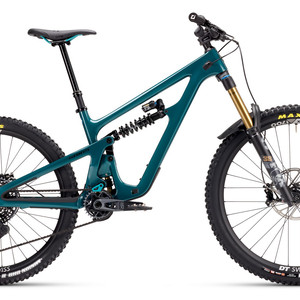
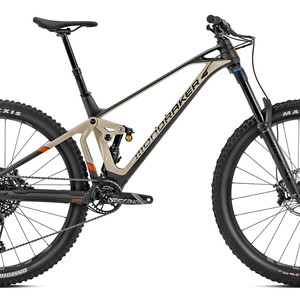
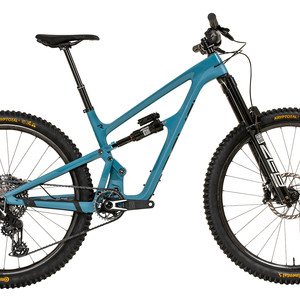
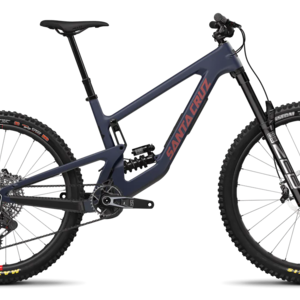
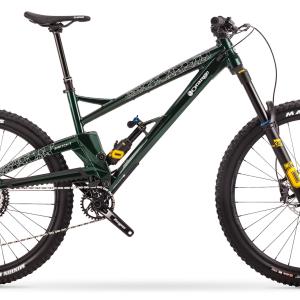
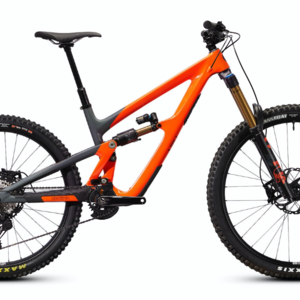
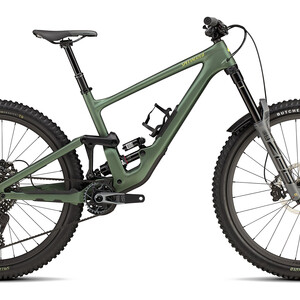
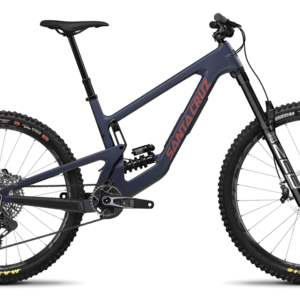






0 comments
Post a reply to: 2021 Santa Cruz Nomad V5 REVIEW